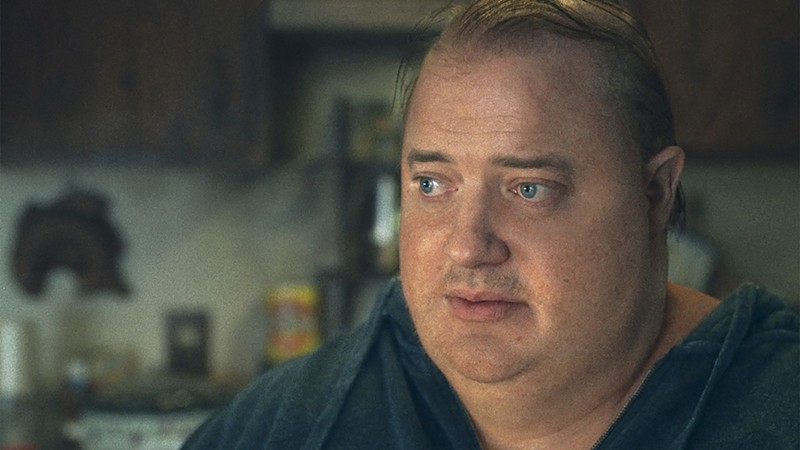Darren Aronofsky has long been obsessed with the frailty — and defilement — of the human body. From a heroin-addicted amputee in Requiem for a Dream (2000) to an aging, steroid-addled hardbody in The Wrestler (2008), from a bulimic ballerina in Black Swan (2010) to a pregnant trophy wife in Mother! (2017), the filmmaker’s most memorable leads move through the world in bodies that betray them or are betrayed by them in equal measure.
His latest psychological drama The Whale is no different — though the type of body portrayed onscreen, and how that body is visually rendered, has prompted no small amount of controversy. Is the graphic depiction of a 600-pound man dying of heart failure automatically grotesque? Is the fat suit donned by lead actor Brendan Fraser itself a form of fat phobia? Or, rather, is the film humanizing — indeed heroizing — a character whose body we are all too groomed to shame?
While all these questions are worth pursuing as far as the ethics of representation are concerned, they have little bearing on the quality of this film, which unfortunately cannot be categorized as one of Aronofsky’s better movies. Indeed, it may very well be his worst (and I say this as one of the only critics out there who enjoyed Mother!). Adapted from a play of the same name by Samuel D. Hunter, The Whale often feels trapped within its own stage-like domestic setting through which Charlie, the film’s reclusive hero, struggles to heave himself off his couch and move within his Idaho apartment. The narrow Academy ratio lends further claustrophobia to the frame — deliberate, perhaps, as it forces our eyes to focus on Charlie, but tendentious in insisting that his body, as spectacle, is enough to lend the movie dramatic heft.
To say this movie is heavy-handed is an understatement: Aronofsky and Hunter overtly spell out the terms of Charlie’s tragic decline and assign unambiguous moral virtues to virtually all the characters onscreen. In an early scene, we learn from Liz (Hong Chau, who manages to make even the most stilted dialogue plausible), Charlie’s good friend and, we later learn, the sister of Alan, his deceased male lover, that he has “only a week to live” if he refuses to go to the hospital. From there on out, the film’s narrative is divided into “Day 1,” “Day 2,” etc., just in case we were not already concerned that Charlie might be on his way out.
Facing imminent mortality, Charlie has good reason to avoid devoting his final week to his job — teaching the basics of a five-paragraph essay to indifferent undergrads online — and so spends the bulk of the film trying to make peace with his estranged teenage daughter, Ellie (Sadie Sink), and ex-wife Mary (Samantha Morton). A sadistic high schooler as devoted to mocking her fat Dad as she is in collecting his life savings, Ellie is not your typical flannel-sporting, smartphone-scrolling Gen-Z delinquent. She manages to exhibit exactly zero redeeming values, despite Charlie’s incessant fawning about her being “an amazing person.” “I’m worried she’s forgotten what an amazing person she is,” he tells Mary, and somehow, we’re supposed to believe this.
Similarly, we are supposed to believe that the body Charlie stuffs with food is an actual obese body. But it is clearly not. In a way, the excess of the fat suit visually distracts from the realities of living in such a body. At times, I found myself stricken with sympathy for Charlie attempting to complete basic, everyday tasks, then would find myself thinking, “But that doesn’t look real.” Did he have to be 600 pounds? Fraser is already a large actor and would arguably be even more vulnerable onscreen as a very overweight man, rather than a morbidly obese one.
In case any were in doubt of the film’s gravitas, Moby Dick is repeatedly referenced to remind us. Reading from what is supposedly Ellie’s hand-written middle-school essay on Herman Melville’s classic (who reads the unabridged version in seventh grade?), Charlie finds meaning in his own sadness, apparently redeemed by the possibility that his daughter was able, at some point, to discern sadness, too. What is most sad about this movie, however, is that none of the people onscreen — no matter their size — bear the complexity of any one of Melville’s minor characters. And it’s too bad. A moving drama about a sympathetic fat person is something I’d love to see — but Aronofsky was not the director to make that movie.
Coming soon: Metro Times Daily newsletter. We’ll send you a handful of interesting Detroit stories every morning. Subscribe now to not miss a thing.
Follow us: Google News | NewsBreak | Reddit | Instagram | Facebook | Twitter


